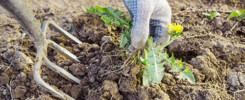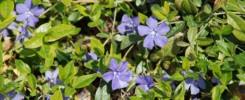 Submitted By: Egan Davis, Principal Instructor (UBC Botanical Garden)
Submitted By: Egan Davis, Principal Instructor (UBC Botanical Garden)

Spring is the busiest time of year for gardeners with a seemingly never-ending list of tasks. Is there ever enough time to get everything done? UBC Botanical Garden’s Egan Davis is here to help! Read his eco-friendly tips to save you time and help you get the most enjoyment out of gardening. Click through to the full article for more detail on any of these tips.
- Stop the Spring Clean-up
Gardens do not have to be clean! Fallen leaves and other plant debris are best left so they can break down, providing nutrients for plants. - Wasting Time with Weeds
Weeding creates disturbance in the soil which results in more weeds. Break this cycle by understanding the enemy. Minimizing disturbance to the soil and covering bare soil with plants or mulch will help keep weeds at bay. - Spring Pruning
Before you prune anything, you should know why you are pruning or you could inadvertently damage the plant. Are you controlling size? Promoting flowers or fruit? Maintaining health and strong growth? Plants like Rhododendrons produce flower buds in the summer that don’t open until the following spring – known as flowering on ‘old wood’. If you prune these shrubs or trees in spring, you need to be careful not to cut off any flower buds or you’ll be waiting another year for beautiful blossoms. - Planting and Transplanting
Most perennial plants, woody and herbaceous, can be planted successfully in Metro Vancouver between the months of September and June as long as the soil isn’t frozen or saturated. For larger woody plants, it is best not to plant too late in the spring. Many perennial plants can also be moved during this period as well. Typically, it is best to stop transplanting large perennial material before April. When planting annual plants, including vegetable food crops, timing depends on whether it’s a warm- or cool-season plant. Cool-season plants (lettuce, spinach and kale, for example) can be planted as early as March. For warm-season plants (such as tomatoes, cucumbers, and squashes), you’ll need to wait until at least the end of May before the soil has warmed up sufficiently. - Forget About Fertilizer
When growing plants in native soil, it’s better to rely on natural processes to maintain healthy nutrient-rich soils rather than buying fertilizer. Use composts and mulches to replenish nutrients lost through harvesting plants. Remove as little material as possible from beds by allowing roots to decompose in the soil and distributing other plant debris with the mulch on the bed surface. - Work Smart, Not Hard
Hard work in the garden is rewarding, but gardeners can save time by embracing ecologically balanced systems that create less work. Setting up a garden so that natural systems are working for you is pure gardening joy. Good luck and enjoy the spring!



